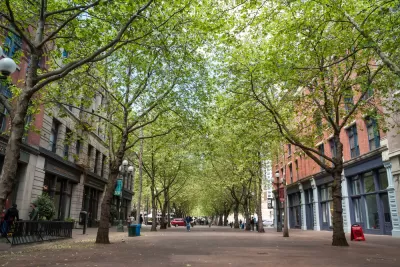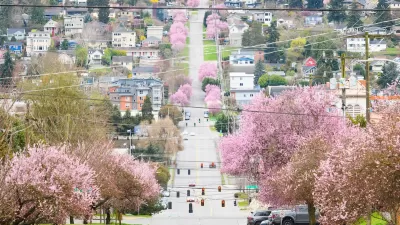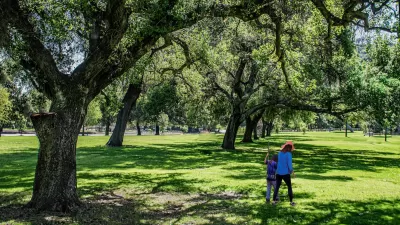Housing and environmental activists are calling on the city to commit to a ‘Trees and’ approach, rejecting the perceived conflict between housing affordability and a healthy urban tree canopy.

An opinion piece by Joshua Morris and Laura Loe calls on Seattle city leaders to commit to both improving housing affordability and preserving and growing the urban tree canopy, arguing that conservation and affordable housing don’t have to be mutually exclusive. As Morris and Loe write, “Much of the controversy springs from exaggerated narratives that pit trees against development, affordable housing, transit, views, solar access, and utilities.”
The authors urge the city to take a different approach. “As Seattle begins to consider its next comprehensive plan, we ask the development community and urban forest advocacy groups to commit to a ‘Trees and’ approach instead. We must protect more big trees and house more neighbors.”
As the article notes, “The planning process is expected to integrate both climate change adaptation/mitigation and racial/social justice. Urban forestry goals can support both major themes.”
After all, urban trees are amazing stormwater managers and air purifiers, plus they help cool our communities. Density advocates, motivated by concerns over the climate emergency and a desire to reduce transportation modes dependent on fossil fuels, should speak loudly on behalf of strengthening our urban tree canopy.
The authors pose some critical questions to consider as the city begins updating its comprehensive plan: “Whose financial responsibility should it be to maintain street trees and residential trees? Will decisions around tree canopy use a Race and Social Justice analysis? Can we move beyond parking strips and reclaim parking lanes for trees? How do we move away from poisonous, colonial, bourgeois lawns? Might we reforest some of Seattle’s public golf course spaces?”
FULL STORY: Seattle Can Have More Trees and More Housing at the Same Time

Alabama: Trump Terminates Settlements for Black Communities Harmed By Raw Sewage
Trump deemed the landmark civil rights agreement “illegal DEI and environmental justice policy.”

Study: Maui’s Plan to Convert Vacation Rentals to Long-Term Housing Could Cause Nearly $1 Billion Economic Loss
The plan would reduce visitor accommodation by 25% resulting in 1,900 jobs lost.

Why Should We Subsidize Public Transportation?
Many public transit agencies face financial stress due to rising costs, declining fare revenue, and declining subsidies. Transit advocates must provide a strong business case for increasing public transit funding.

Wind Energy on the Rise Despite Federal Policy Reversal
The Trump administration is revoking federal support for renewable energy, but demand for new projects continues unabated.

Passengers Flock to Caltrain After Electrification
The new electric trains are running faster and more reliably, leading to strong ridership growth on the Bay Area rail system.

Texas Churches Rally Behind ‘Yes in God’s Back Yard’ Legislation
Religious leaders want the state to reduce zoning regulations to streamline leasing church-owned land to housing developers.
Urban Design for Planners 1: Software Tools
This six-course series explores essential urban design concepts using open source software and equips planners with the tools they need to participate fully in the urban design process.
Planning for Universal Design
Learn the tools for implementing Universal Design in planning regulations.
Caltrans
Smith Gee Studio
Institute for Housing and Urban Development Studies (IHS)
City of Grandview
Harvard GSD Executive Education
Toledo-Lucas County Plan Commissions
Salt Lake City
NYU Wagner Graduate School of Public Service





























